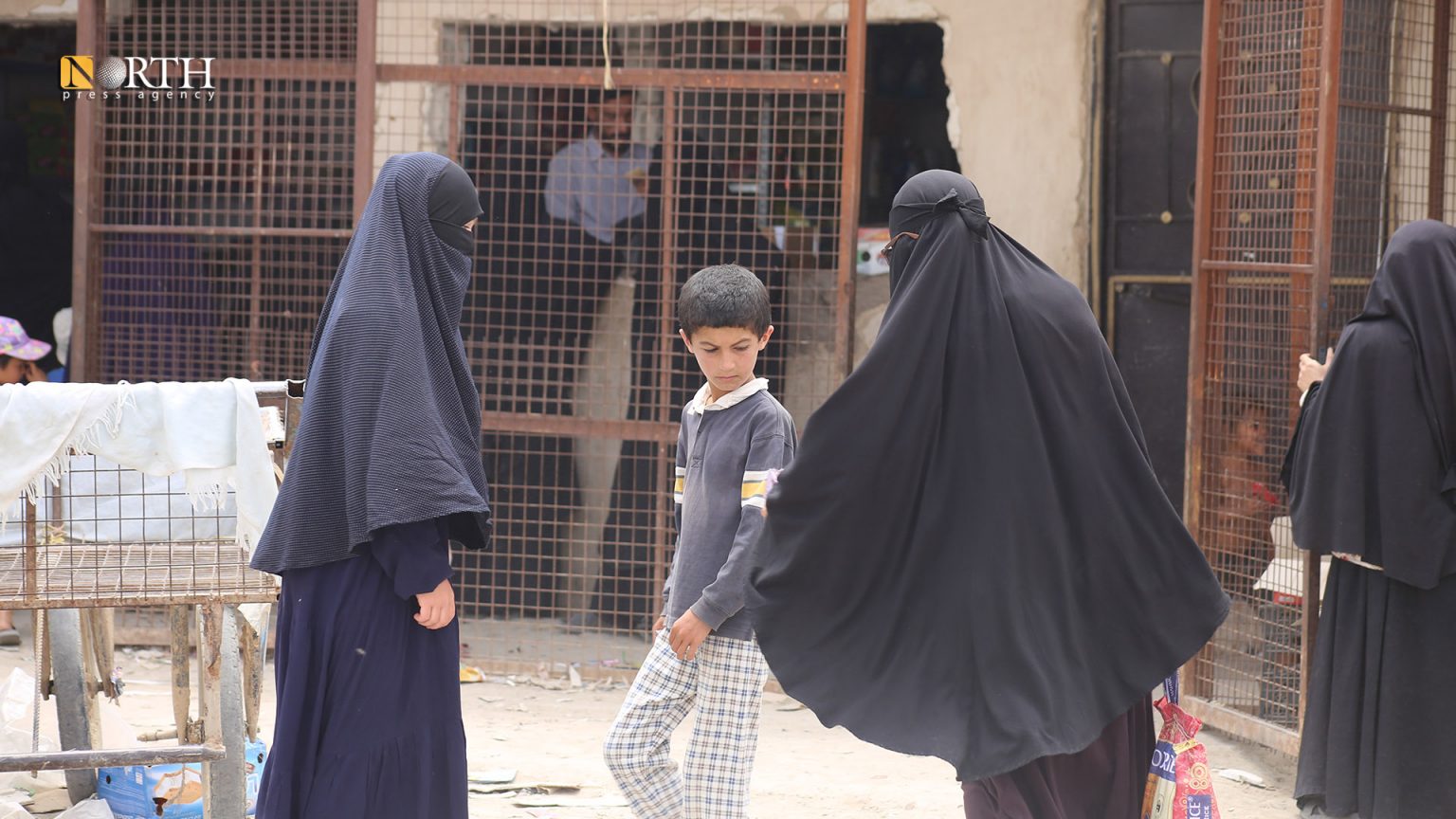DERIK, Syria (North Press) – ISIS wives of Arab nationality who were transferred months ago from Hawl Camp, east of Hasakah, to Roj Camp near the city of Derik say that in the new camp, they have escaped the threats to their lives and their children’s.
About 757 families live in Roj Camp, including 2,562 of Syrian IDPs, Iraqi refugees, and ISIS families of different nationalities, according to Noura Abdo, the head of Roj Camp.
The total number of ISIS families that arrived from Hawl Camp to Roj Camp has reached 270, and camp administration plans to bring the number of families to 400.
In October, the Autonomous Administration of North and East Syria, based on the initiative launched by the Syrian Democratic Council and the wishes of the tribal notables and sheikhs, decided to evacuate Syrian families who wished to leave Hawl Camp.
No threats in Roj camp
Assia al-Rabi’, a Moroccan ISIS wife and mother of two who was transferred from Hawl Camp to Roj, said, “I have been in Roj Camp for seven months; we faced a lot of difficulties in Hawl Camp. Roj Camp is much better than Hawl Camp in all respects.”
Al-Rabi’ arrived in Syria in 2014 and moved between different areas, including Raqqa, Palmyra, Homs, Hajin, al-Susah, and Baghouz in Deir ez-Zor, and reached Hawl Camp in 2019, according to what she told North Press.
The woman added that the state of fear and anxiety did not leave her during her stay in Hawl Camp, “As for the security situation in Hawl, we were very afraid, as at any moment sisters might kill us or burn the tent while we slept.”
Al-Rabi` believes that the large number of families in Hawl Camp prevents the guards and security personnel from controlling the killings and arson incidents there.
Burning and killing
Women from ISIS families who have transferred to Roj Camp say that they have escaped the risks of killing and burning that were threatening their lives and their children’s in Hawl Camp.
During the first week of the new year, 12 murders were documented in Hawl camp, including Syrian IDPs and Iraqi refugees, which is the highest weekly toll in the camp to date.
There are 2,625 foreign ISIS families, or a total of 8,965 people, in the camp, according to Refugees Office chair of the Autonomous Administration Sheikhmous Ahmed.
The number of Syrian families in Hawl Camp has reached 6,155, with a total of 22,231 people, and 8,284 Iraqi families, with a total of 30,706 people, according to Ahmed.
Afraid of sisters
Huda Ali, an ISIS Egyptian wife and mother of five, said that she entered Syria through Aleppo in 2015 and later moved to Idlib, where her husband was working with al-Nusra Front at the time, to join ISIS and head in 2017 to Baghouz.
After the defeat of ISIS in the Baghouz in Deir ez-Zor by the Syrian Democratic Forces (SDF) with the support of the Global Coalition, Ali was transferred with her family to Hawl Camp, where she stayed for about a year and a half, and was transferred to Roj Camp about eight months ago.
“Roj Camp is much better than Hawl Camp in everything. We feel safe here in everything; at Hawl we were afraid of the sisters,” Ali said.
“For example, in our legitimate clothing if we did not wear it well, we would have faced problems; we were afraid of the sisters,” she added.
Sisters, referring to foreign ISIS women, used to murder or burn tents of those who didn’t obey them. “We were afraid that they would burn the tent while we slept, in everything this is permissible, and this is forbidden, it is not permissible for you to dress like this, but here in Roj camp we are free, we dressed up the way we like,” Ali explained.
Ali does not know if her family is seeking to return her to her country as she wishes, especially since her first husband was killed and the second detained.
“The situation is very good here; we lack nothing. We are comfortable in all respects, but we want to be free and go to our country,” she said.
Organizations
Nora Abdo, an administrator in Roj Camp, said, “The security and service situation compared to Hawl is somewhat stable.”
“The security situation in Roj Camp is stable because it is a small camp, so we can control it, we did certain procedures, such as banning black clothing and lifting the veil,” she added.
So far, the camp has not documented any killings or arson incidents, while the camp administration provides psychological support through the Women associations, in addition to training courses by the IRC organization on the professions of sewing, knitting and embroidery.
Noura Abdo said, “We face many difficulties with the organization, for example, failure to meet needs on time. So far, winter clothes have not been distributed by UNICEF, and there is also a great shortage of drugs, as the organization didn’t take care of those with chronic diseases.”

